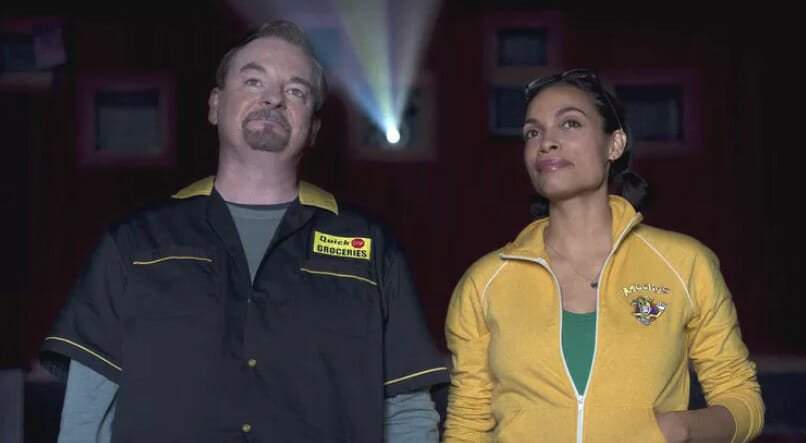SUMMARY
Considering the quality, quantity, and diversity of films distributed under the Lionsgate, GLAAD has given Lionsgate a Failing grade.
Unfortunately, the only film with LGBTQ representation from Lionsgate was a brief moment in Clerks III where the protagonist’s deceased wife mentioned the men and women she slept with in heaven. It reads as more a throwaway joke than real representation. GLAAD urges Lionsgate to make efforts for solid and meaningful LGBTQ representation in future projects.
HISTORY
Canadian businessman Frank Guistra founded Lionsgate in 1997. Over 25 years later, the studio has produced and distributed major blockbusters such as Twilight, Hunger Games and the John Wick franchises. Lionsgate also owns a variety of subsidiaries such as Summit Entertainment.
An early inclusive Lionsgate release was The Pillow Book (1997), in which Ewan McGregor plays a bisexual man. Additional LGBTQ-inclusive films from Lionsgate include Gods and Monsters (1998), But I’m a Cheerleader! and Urbania (2000), Lost and Delirious and All Over the Guy (2001), Happy Endings (2005), Precious (2009), The Perks of Being a Wallflower (2012), American Ultra, Freeheld (2015), Un Padre No Tan Padre (2017), and Bombshell (2019).
CLERKS III
WIDEST THEATRICAL RELEASE: 1,089 THEATERS
Vito Russo Test: FAIL
Clerks III continues to tell the story of Dante and Randal working at the convenience store and their attempt to make a movie about their experiences. Part of the film includes Dante grieving his ex-wife, Becky, who appears in several of Dante’s dreams. During one of them, she lists all the famous dead people in Heaven that she is having sex with, including Cleopatra. Becky’s bisexuality is played more as a joke than real development, feeding into the notion that being bisexual means a person is inherently promiscuous.
THE UNBEARABLE WEIGHT OF MASSIVE TALENT
WIDEST THEATRICAL RELEASE: 3,036
Vito Russo Test: FAIL
There were no LGBTQ characters in this film, but a couple references to the LGBTQ community. Nicholas Cage, as himself speaking to a hallucination of himself, talks about playing a “gay uncle” as a film role to be taken seriously. He also passionately kisses the hallucination of himself, but that is more an expression of self-love than any actual queer identity. Cage also expresses trepidation for a moment about if a rich businessman will ask for sexual favors, but that does not occur.













